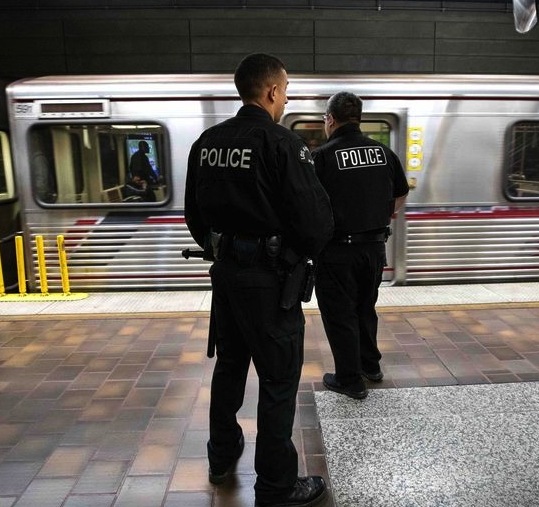Wave Wire Services
LOS ANGELES — Two weeks after announcing the deployment of nearly 200 unarmed ambassadors aboard its trains and buses, the Los Angeles County Metropolitan Transportation Authority announced March 27 it has approved the hiring of 48 new transit security officers to bolster public safety.
The MTA Board of Directors’ decision to increase its number of transit security officers is part of efforts to advance its public safety plan, which calls for a layered, “human-centered” approach aimed at making the system safer.
The announcement came four days after the MTA board voted to negotiate and extend its current multi-agency transit law enforcement contracts with modifications for up to three additional years, through June 2026. That action extended contracts with the Los Angeles Police Department, Long Beach Police Department and Los Angeles County Sheriff’s Department to support day-to-day bus and rail operations across the MTA’s entire service area. Those contracts were set to expire June 30.
As part of the motion, the MTA staff was directed to bring back a report in May on the feasibility of creating an in-house public safety agency.
In addition to the new transit security personnel, the MTA is working with the city and county of Los Angeles to add homeless outreach, drug addiction and crisis intervention teams, and is improving its use of security cameras, lighting and more frequent cleaning of stations and vehicles.
The board also approved new bias-free policing and public analytics policies, including a revised customer code of conduct, to ensure consistency with its public safety mission and values that were adopted by the board in 2021, according to the agency.
“The [transit] system is certainly not immune from the broader societal challenges we see throughout our county, but we are steadfast in our commitment to taking all steps necessary to promote a safe and pleasant transit experience for every one of our riders,” Ara Najarian, chair of the MTA Board of Directors, said in a statement.
The board’s approval of funding to hire more transit security officers will create a permanent bus riding team that will be deployed to specific lines with high frequencies of public safety issues, with a primary objective of deterring bus operator assaults and code of conduct violations.
According to the MTA, these positions are of significant need as the agency reported 158 assaults on bus operators in 2022, an increase from 115 in 2021.
“It is important that we’re finally going to have a team of transit security officers who are dedicated to our buses and are actually riding them alongside our passengers,” County Supervisor Janice Hahn, second vice chair of the MTA board, said in a statement. “Most of [our] consistent transit riders take the bus and they deserve a safe and comfortable ride.”
According to the transit agency, the MTA’s new bias-free policing and public safety analytics policies are meant to set clear expectations and standards to help eliminate potential bias in the way the transit system is patrolled. Previously, the MTA found evidence that suggested racial bias might have been a factor in citations given to riders.
“These policies establish clear expectations and standards for fair and unbiased policing and reinforce the importance of treating all individuals with respect and dignity,” Jacquelyn Dupont-Walker, the MTA’s first vice chair of the board, said in a statement.
Lastly, the board approved a revised code of conduct that uses clearer, more user-friendly language. The MTA also removed items that are already covered under the existing penal code.
“All of these initiatives build upon work we have been doing over the last year to put our public safety plan into action,” said Stephanie Wiggins, the MTA’s chief executive officer, in a statement. “This plan utilizes proactive response, strategic enforcement and equitable rule compliance, and is key to maintaining public safety for our customers.”
“We know we have a lot of work to do, but we are clearly making progress in the right direction,” she continued.
The item to move forward with current multi-agency transit law enforcement contracts resulted in a lengthy discussion March 23 with county Supervisors Holly Mitchell, who abstained, and Lindsey Horvath, who voted no, voicing their concerns.
Mitchell brought up various points including questions about how the MTA will manage costs that account for inflation and what funding resources will help pay for any additional costs. She also referenced a 2022 audit report from the Office of the Inspector General, which reflected challenges the MTA faced in the deployment of contracted law enforcement services.
“Concerns that have been identified include poor police visibility on buses, trains and at stations, inconsistent staffing at key critical infrastructure locations and ineffective monitoring and oversight of contracted law enforcement personnel to ensure they are patrolling on the [MTA] system,” the 2022 audit said.
Mitchell asked MTA staff for a report that included details on a cost-savings approach to creating a public safety agency, what training would look like, what percentage of those officials would be unarmed versus armed and ways for that agency to be held accountable and remain transparent.
Mayor Karen Bass, who also sits on the MTA board said she was interested in the concept of an in-house public safety agency.
“I’m very excited at the notion of creating an in-house agency that could be a real opportunity to re-envision public safety, especially public safety connected to transportation,” Bass said. “What we have traditionally done is looked at trying to change the culture of an existing institution, which is a lot more difficult in creating a new institution with a new culture.
“I’m going to vote to continue to extend the contracts because I know that this is going to take quite a while for us to get to.”











